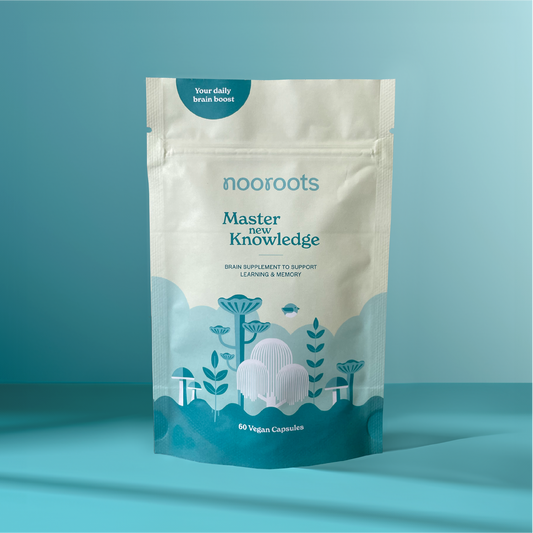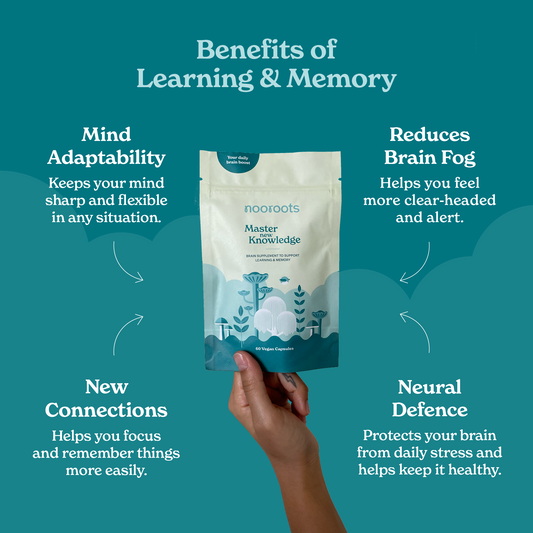Nootropics—commonly known as “smart drugs” or cognitive enhancers—are compounds that support and enhance various aspects of brain function. Originally coined in the 1970s by Dr. Corneliu Giurgea, the term nootropic describes substances that may improve mental performance without causing significant side effects or dependence.
In an era defined by constant information flow and digital distraction, maintaining sustained focus and mental clarity has become increasingly challenging. Natural nootropics, derived from plants, amino acids, and other bioactive compounds, have gained attention for their potential to enhance cognitive processes such as attention, memory, creativity, and motivation in otherwise healthy individuals.
This blog explores some of the most effective natural nootropics for improving focus and concentration, examining the evidence behind their benefits and practical strategies for incorporating them into everyday life.
Table of Contents
- Understanding Focus and Concentration
- Top Natural Nootropics for Focus and Concentration
- How to Incorporate Natural Nootropics into Your Routine
The Best Nootropics for Focus and Concentration

Understanding Focus and Concentration
Focus and concentration are fundamental cognitive processes that allow us to filter information, prioritize tasks, and solve problems effectively. Without them, even simple activities can become fragmented and inefficient.
Focus is the capacity to direct mental attention toward a single task or objective. Concentration, on the other hand, is the ability to sustain that attention over time—resisting internal and external distractions. While they work hand in hand, each can be influenced by different factors such as stress, fatigue, poor sleep, or the constant influx of digital stimuli that dominate modern life.
Nootropics have emerged as a natural means to counter these challenges. Unlike pharmaceutical stimulants that may carry risks of dependency or unwanted side effects, many natural nootropics can support cognitive performance in a gentler, more sustainable way. They do so by influencing the brain’s chemical environment—optimizing neurotransmitter balance, improving neural signaling, and supporting cellular energy production.
Key neurotransmitters such as dopamine, norepinephrine, and acetylcholine are central to attention and cognitive control. Dopamine enhances motivation and reward-driven focus; norepinephrine sharpens alertness and reaction time; acetylcholine supports learning and sustained concentration. By modulating the activity of these systems, certain nootropics can enhance both the quality and duration of mental focus.
In practice, this translates to clearer thinking, improved task engagement, and greater cognitive endurance—benefits that extend across professional, academic, and creative pursuits.
Top Natural Nootropics for Focus and Concentration
Guarana Seed:
- Origin and Traditional Use: Guarana (Paullinia cupana) is a climbing plant native to the Amazon basin, known for its large seeds rich in caffeine. Traditionally, indigenous tribes have used guarana seeds to brew stimulating beverages and as a natural remedy for various ailments. Its seeds are celebrated for their energizing properties and have been a part of Amazonian culture for centuries.
- Mechanism: Guarana seeds contain a high concentration of caffeine, which acts as a central nervous system stimulant. Unlike other sources of caffeine, guarana provides a slow release, which results in sustained alertness without the typical crash associated with coffee.
- Benefits: Guarana enhances focus, attention, and memory by blocking adenosine receptors, increasing the release of neurotransmitters such as dopamine and norepinephrine. Additionally, the presence of other compounds like theobromine and antioxidants further supports cognitive functions and protects brain cells from oxidative stress .
L-Theanine:
- Common Sources: L-Theanine is an amino acid predominantly found in green tea leaves. It is well-known for its calming effects and is commonly consumed as part of tea rituals in various cultures.
- Mechanism: L-Theanine increases levels of GABA, dopamine, and serotonin, which are neurotransmitters associated with relaxation and mood regulation. It promotes a state of relaxed alertness, especially when combined with caffeine, by enhancing alpha brain wave activity.
- Benefits: L-Theanine helps improve focus and attention by promoting mental relaxation without drowsiness. When combined with caffeine, it can enhance cognitive performance and increase alertness, making it an excellent natural nootropic for sustained concentration .
Acetyl-L-Carnitine (ALCAR):
- Natural Occurrence and Dietary Sources: Acetyl-L-Carnitine (ALCAR) is an amino acid derivative found naturally in the body and in foods such as red meats. It plays a critical role in energy production by transporting fatty acids into mitochondria.
- Mechanism: ALCAR supports mitochondrial function and energy production, which is crucial for brain health. It also exhibits neuroprotective properties, helping to maintain cognitive functions.
- Benefits: ALCAR is known to improve mental energy, focus, and memory. It helps reduce cognitive decline associated with aging and enhances overall cognitive performance, making it a valuable supplement for maintaining brain health .
Ginkgo Biloba:
- Background and Historical Use: Ginkgo biloba, derived from one of the oldest living tree species, has been used in traditional Chinese medicine for centuries. It is renowned for its ability to enhance mental clarity and memory.
- Mechanism: Ginkgo biloba enhances cerebral blood flow and possesses strong antioxidant properties. It helps protect neurons from oxidative damage and modulates neurotransmitter systems.
- Benefits: Ginkgo biloba can improve cognitive function, including focus, memory, and processing speed. It is particularly beneficial for enhancing mental performance and protecting against age-related cognitive decline .
Rhodiola Rosea:
- Background and Historical Use: Rhodiola Rosea is an adaptogenic herb that thrives in cold, mountainous regions of Europe and Asia. It has been used historically to combat fatigue and enhance physical and mental endurance.
- Mechanism: Rhodiola Rosea boosts neurotransmitter activity and has neuroprotective effects, helping the body resist physical and mental stress.
- Benefits: This herb improves attention, cognitive function, and mental performance under stress. It is particularly effective in reducing fatigue and enhancing resilience to stress, making it a powerful nootropic for maintaining focus and productivity .
Bacopa Monnieri:
- Traditional Applications and Active Compounds: Bacopa Monnieri, commonly known as Brahmi, has been used in Ayurvedic medicine for centuries. It is valued for its ability to enhance memory and cognitive function.
- Mechanism: Bacopa Monnieri enhances synaptic communication and modulates neurotransmitter levels, which supports cognitive processes.
- Benefits: Bacopa Monnieri improves memory formation, attention, and reduces anxiety. Its neuroprotective properties make it a beneficial supplement for enhancing overall brain health .
Citicoline:
- Natural Occurrence and Dietary Sources: Citicoline is a naturally occurring compound found in the brain and in dietary sources like organ meats.
- Mechanism: Citicoline increases the synthesis of phosphatidylcholine, a key component of cell membranes, and enhances neurotransmitter levels, particularly acetylcholine.
- Benefits: Citicoline improves focus, cognitive speed, and attention. It supports brain health by boosting energy production and enhancing neuronal communication .
N-Acetyl L-Tyrosine (NALT):
- Origin and Natural Sources: N-Acetyl L-Tyrosine (NALT) is a modified form of the amino acid L-Tyrosine, which is found in foods like chicken, turkey, and dairy products.
- Mechanism: NALT serves as a precursor for dopamine and norepinephrine, neurotransmitters that are crucial for cognitive flexibility and stress response.
- Benefits: NALT enhances cognitive flexibility, reduces stress, and improves performance in mentally demanding tasks. Its ability to support neurotransmitter synthesis makes it an effective nootropic for maintaining mental sharpness and adaptability .
How to Incorporate Natural Nootropics into Your Routine
Tips for Selecting High-Quality Supplements
When selecting natural nootropic supplements, choose reputable brands that provide full transparency about ingredient sourcing, dosages, and clinical evidence. Opt for standardized extracts and bioavailable nutrient forms, and verify that each product has undergone independent third-party testing for purity and potency. Look for certifications such as GMP, NSF, or ISO to ensure manufacturing quality, and avoid proprietary blends or unnecessary additives. Reputable brands should publish Certificates of Analysis (COAs) and comply with relevant regulatory standards to guarantee safety, efficacy, and integrity.
Recommended Dosages and Timing for Optimal Effects
Dosages for nootropics can vary depending on the specific compound and individual needs. For example:
- Guarana Seed: 75-1,000mg per day, typically in divided doses.
- L-Theanine: 100-400 mg per day, often taken with caffeine.
- Acetyl-L-Carnitine (ALCAR): 250-4,000 mg per day.
- Ginkgo Biloba: 60-240 mg per day.
- Rhodiola Rosea: 100-400 mg per day.
- Bacopa Monnieri: 300-600 mg per day.
- Citicoline: 250-2,000 mg per day.
- N-Acetyl L-Tyrosine (NALT): 100-300 mg per day.
These dosages should ideally be taken in the morning or early afternoon to align with periods of cognitive demand and to avoid interference with sleep.
Advising Consultation with a Healthcare Provider Before Starting Any New Supplement
Before beginning any new supplement regimen, consult a qualified healthcare professional to ensure safety and suitability. This is especially important if you have pre-existing health conditions, are pregnant or breastfeeding, or are taking prescription medications, as certain nootropics may interact with drugs or influence underlying health factors. A healthcare provider can help assess potential contraindications, recommend evidence-based dosages, and tailor supplement use to your individual physiology and cognitive goals.

Conclusion
Natural nootropics offer a balanced, evidence-based way to enhance focus, concentration, and overall cognitive performance. Ingredients such as Guarana Seed, L-Theanine, and Rhodiola Rosea have been shown to improve alertness, sustain attention, and reduce fatigue—without the overstimulation often linked to synthetic alternatives.
Used thoughtfully and under professional guidance, these supplements can complement a holistic cognitive routine that includes quality sleep, nutrition, and mental training. When integrated consistently, natural nootropics can help cultivate sharper focus, greater mental clarity, and lasting cognitive resilience.





